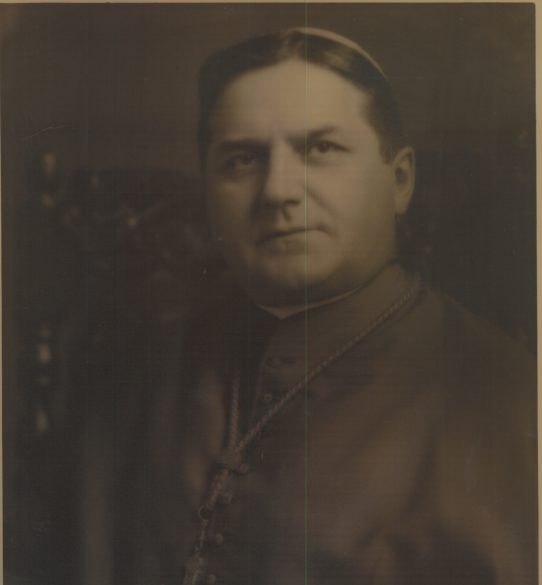From the Archives
By Mary Woodward
JACKSON – This week I am highlighting a neighbor to the south of us – Archbishop Joseph F. Rummel, who was Archbishop of New Orleans from 1935 to his death in November 1964. His tenure runs almost parallel to our own Bishop R.O. Gerow (1924-66).
In talking with our Bishop Emeritus, Joseph Latino, who grew up and went to seminary during the Rummel years, Bishop Latino shared some insight into the life of the archbishop saying he was very much committed to ending segregation even in the face of strong push back from Catholic community and business leaders. An interesting timeline develops beginning in 1949.
It seems in 1949, Archbishop Rummel canceled an outdoor liturgy when city officials would not allow African American Catholics to participate. In 1950 he had “White” and “Colored” signs removed from churches. Rummel mandated an end to the practice of making African American Catholics receive Communion last in 1953. These measures met with resistance from laity and clergy.

To ground his efforts solidly in Catholic theology, Rummel issued a letter to be read in all parishes Feb. 11, 1956. Now Rummel was famous for his long letters to be read to parishioners at Sunday Masses, but this one rocked the entire archdiocese. The letter was laying groundwork to integrate the archdiocesan school system. In the letter Rummel gives three main points quoted below courtesy of the Archdiocese of New Orleans Archives.
“Racial segregation is morally wrong and sinful ‘because it is a denial of the unity and solidarity of the human race as conceived by God in the creation of man in Adam and Eve. Male and female He created them and breathed into them the spirit of life and commanded them to increase and multiply and fill the earth. Throughout the pages of the Old Testament and the New there is constant recurrence of this truth, that all mankind has in Adam and Eve one common father and mother and one common destiny, namely, to serve God in this world and find eternal happiness with Him in the world to come.
“Racial segregation is morally wrong and sinful because it is a denial of the unity and universality of the Redemption. The Eternal Son of God, Christ Jesus our Lord, came into the world to redeem and save all men, to die for all men on the cross, to make the life of grace available through the Church and the Sacraments for all men, to embrace all men in His Mystical Body on earth and in the life of glory in heaven. Racial segregation would draw the color line across the inspiring plan of the Redemption and thus sin against the divine providence. the love and the mercy that conceived and carried out the wonderful Mystery.
“Racial segregation is morally wrong and sinful because it is basically a violation of the dictates of justice and the mandate of love, which in obedience to God’s will must regulate the relations between all men. To deny to members of a certain race, just because they are members of that race, certain rights and opportunities, civic or economic, educational or religious, recreational or social, imposes upon them definite hardships and humiliations, frustrations and impediments to progress which condemn them to perpetual degradation which is only a step removed from slavery. Such indignities are grievous violations of Christian justice and charity, which cannot be justified in this modem age of enlightenment and loudly proclaimed democracy.”
Rummel concludes the letter aware of opposition by calling for calm and prayer: “May we likewise unite in prayer that the decision, when made, will be accepted in the spirit of Christian charity and justice and in that unity of mind, heart and will, which must always characterize the family of God. This is a problem which should be worked out not in an atmosphere of wrangling or contention or discord or hatred but in a spirit of conciliation and with a desire to achieve peace through justice and charity. Prayer and calmness of spirit are much needed in all our hearts, and for these we plead in the name of the Divine Prince of Peace…”
Despite warnings of possible excommunication, local Catholic political, business and community leaders formed opposition groups to combat Rummel’s move to push for integrated Catholic schools in 1957. They even appealed to the Vatican but were rebuffed by the Holy See. Rummel was even the recipient of a burning cross on the front lawn of the archbishop’s residence.
Ultimately, three leaders were excommunicated, but the opposition continued and delayed the integration plans of Rummel. One reason for delaying was the recognition that white Catholics would leave Catholic schools if integrated and go to the public schools which were not yet integrated. So, archdiocesan leaders advised Rummel to wait to integrate Catholic schools until the public schools integrated in 1960.
In listening to Bishop Latino talk about his memories of all the events, he lamented the fact Archbishop Rummel suffered greatly from the intolerance and disrespect, but admired Rummel’s steadfastness in his mission in the face of that suffering. Latino even remarked that the church missed an opportunity to make a bold statement to the world by bestowing Rummel with the red hat of a Cardinal – honoring a man with principles like rails of steel from which he did not waiver.
In future articles, we will explore the integration of Catholic schools in our diocese which has a similar path though I am not aware of any excommunications. We also will throw in some more insights from our Emeritus.
(Mary Woodward is Chancellor and Archivist for the Diocese of Jackson)
